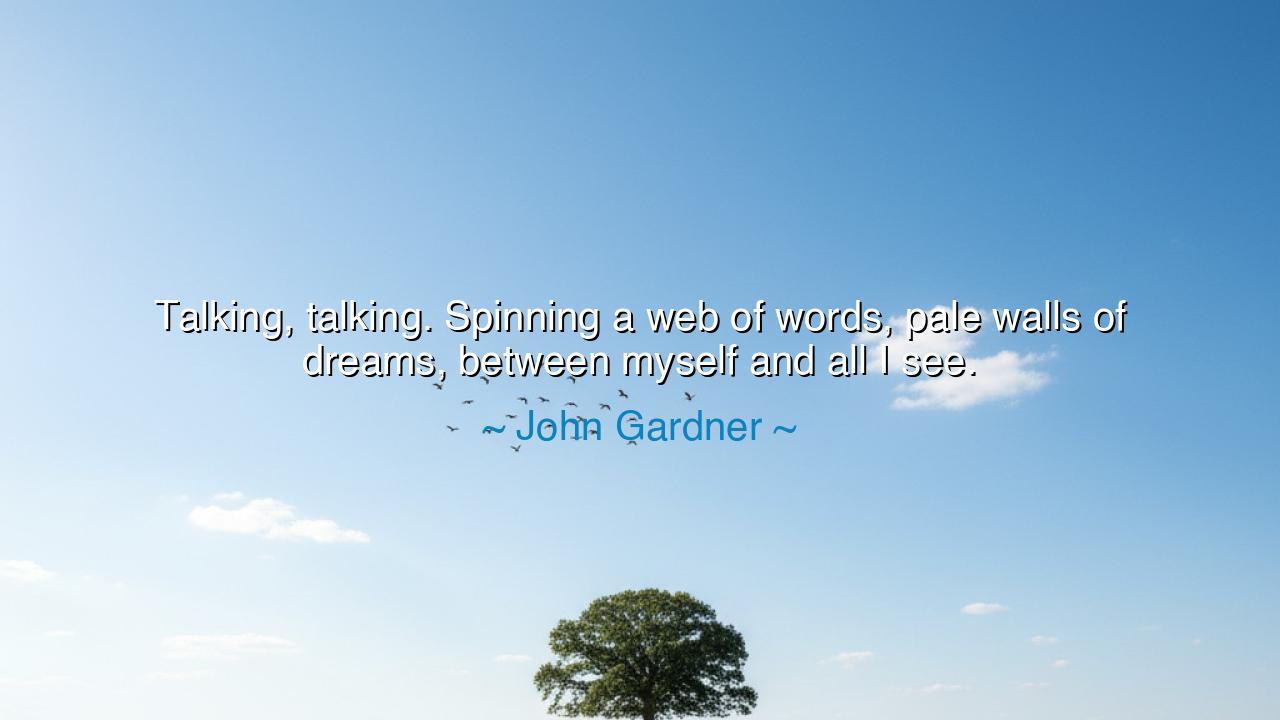
Talking, talking. Spinning a web of words, pale walls of dreams
Talking, talking. Spinning a web of words, pale walls of dreams, between myself and all I see.






"Talking, talking. Spinning a web of words, pale walls of dreams, between myself and all I see." — John Gardner
In this haunting reflection, John Gardner, the philosopher-novelist and moral teacher of American letters, exposes one of the deepest paradoxes of the human soul — that we often build walls of words where we mean to build bridges. The quote is not merely a lament on speech, but a meditation on the distance between language and reality, between dream and truth. He reveals the subtle danger of becoming lost in our own talking, of weaving such a dense web of words that we no longer touch the living world beyond them. It is a warning from a man who loved language but feared its power to deceive the self.
To “spin a web of words” is a delicate art — it is the work of poets, prophets, and thinkers. Yet Gardner knew that words, for all their beauty, can also imprison the one who wields them. Like the spider, man spins his thoughts from within himself, creating structures of meaning that shimmer in the light — but if he clings too tightly to them, he becomes ensnared in his own design. The pale walls of dreams he speaks of are not made of stone, but of ideas, of illusions woven so finely that we mistake them for reality. Thus, man risks living in a self-made palace of imagination, separated from the raw, sacred pulse of existence.
This insight is as ancient as it is modern. The Greek philosophers spoke of the same struggle — the tension between logos (word, reason) and aletheia (truth, the unveiled reality). Even Socrates, master of dialogue, warned against rhetoric that delights in sound but loses sight of substance. Gardner’s lament echoes this timeless wisdom: that the more we speak without presence, the more we drown in abstraction. Words meant to reveal can become veils; the more we explain life, the less we feel it. The world grows distant, blurred behind the mist of our endless discourse.
Consider the tragic genius of Friedrich Nietzsche, whose brilliance illuminated the world yet whose mind became ensnared by its own storm of thoughts. He wrote, he reasoned, he redefined God and morality — and yet, at the end, he fell silent, broken by the weight of his own intellect. His web of words had become a labyrinth with no door. Here lies Gardner’s warning in living form: when words replace wonder, when philosophy becomes cage instead of key, the soul begins to starve. True wisdom demands that we step beyond the safety of speech into the living silence of being.
And yet, Gardner does not condemn language itself — for he was a man of letters, a master of its power. Rather, he calls us to awareness, to humility in our use of words. Words are sacred tools, not mirrors for vanity. They can shape nations, heal wounds, and inspire the weary — but only when they remain connected to truth. When speech is guided by sincerity, by presence, it becomes bridge instead of barrier. The wise do not speak to escape reality, but to illuminate it. Their words are not walls of dreams but pathways of light.
Let this teaching, then, be remembered: speak less, but mean more. Seek not to fill silence with chatter, but to let your words rise from experience, not illusion. Listen deeply — to the wind, to the eyes of another, to the quiet voice within that speaks without language. Do not mistake the description of life for life itself. Touch the world as it is — not as you name it. The flower does not bloom because it is called “beautiful”; it blooms because it is alive. So too should your soul bloom in silence and truth, not merely in talk and thought.
For in the end, my child, words are dreams, and dreams are pale unless they awaken something real. Let your speech be honest, your thought humble, your silence fertile. Do not weave so thick a web that you can no longer feel the sunlight upon your face. Speak, yes — but speak to connect, not to conceal. Remember Gardner’s wisdom: beyond the web of words lies the living world, and only those who dare to step through their own illusions will truly see.






AAdministratorAdministrator
Welcome, honored guests. Please leave a comment, we will respond soon